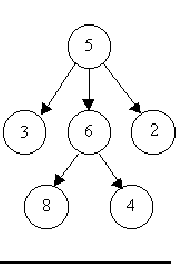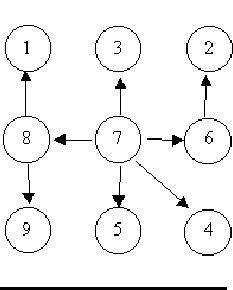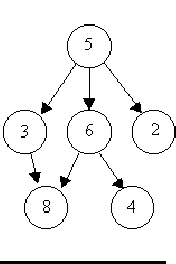Is It A Tree?
Time Limit: 2000/1000 MS (Java/Others) Memory Limit: 65536/32768 K (Java/Others)
Total Submission(s): 14525 Accepted Submission(s): 3232
Problem Description
A
tree is a well-known data structure that is either empty (null, void,
nothing) or is a set of one or more nodes connected by directed edges
between nodes satisfying the following properties.
There is exactly one node, called the root, to which no directed edges point.
Every node except the root has exactly one edge pointing to it.
There is a unique sequence of directed edges from the root to each node.
For example, consider the illustrations below, in which nodes are represented by circles and edges are represented by lines with arrowheads. The first two of these are trees, but the last is not.



In this problem you will be given several descriptions of collections of nodes connected by directed edges. For each of these you are to determine if the collection satisfies the definition of a tree or not.
There is exactly one node, called the root, to which no directed edges point.
Every node except the root has exactly one edge pointing to it.
There is a unique sequence of directed edges from the root to each node.
For example, consider the illustrations below, in which nodes are represented by circles and edges are represented by lines with arrowheads. The first two of these are trees, but the last is not.



In this problem you will be given several descriptions of collections of nodes connected by directed edges. For each of these you are to determine if the collection satisfies the definition of a tree or not.
Input
The
input will consist of a sequence of descriptions (test cases) followed
by a pair of negative integers. Each test case will consist of a
sequence of edge descriptions followed by a pair of zeroes Each edge
description will consist of a pair of integers; the first integer
identifies the node from which the edge begins, and the second integer
identifies the node to which the edge is directed. Node numbers will
always be greater than zero.
Output
For
each test case display the line ``Case k is a tree." or the line ``Case
k is not a tree.", where k corresponds to the test case number (they
are sequentially numbered starting with 1).
Sample Input
6 8 5 3 5 2 6 4
5 6 0 0
8 1 7 3 6 2 8 9 7 5
7 4 7 8 7 6 0 0
3 8 6 8 6 4
5 3 5 6 5 2 0 0
-1 -1
Sample Output
Case 1 is a tree.
Case 2 is a tree.
Case 3 is not a tree.
Source
判断一棵树: (1)无环 ,(2)入度为0点有且仅有一个,其余点入度仅为1。(3)n个节点,必然有n-1条边
提供的一些数据:
/* 6 8 5 3 5 2 6 4 5 6 0 0 8 1 7 3 6 2 8 9 7 5 7 4 7 8 7 6 0 0 3 8 6 8 6 4 5 3 5 6 5 2 0 0 1 2 3 2 4 2 5 2 0 0 1 2 3 4 4 3 0 0 0 0 1 1 0 0 1 2 2 1 0 0 1 2 2 3 3 4 4 1 0 0 1 2 2 3 3 1 5 6 0 0 2 3 0 0 -1 -1 */
答案:
/* Case 1 is a tree. Case 2 is a tree. Case 3 is not a tree. Case 4 is not a tree. Case 5 is not a tree. Case 6 is a tree. Case 7 is not a tree. Case 8 is not a tree. Case 9 is not a tree. Case 10 is not a tree. Case 11 is a tree. */
代码:
#include<stdio.h> #include<string.h> #include<stdlib.h> bool hasp[10000]; struct node{ int father,rank; }; node root[10000]; void init(){ int i; root[0].rank=0; root[0].father=0; for(i=1;i<10000;i++){ root[i].father=i; root[i].rank=1; } } int find(int a){ while(a!=root[a].father) a=root[a].father; return a; } void Union(int a,int b){ /*a->b*/ root[b].father=a; root[a].rank+=root[b].rank; } int main(){ freopen("test.in","r",stdin); //system("call test.in"); int a,b,cnt,x,y,cas=1,tem; bool flag; while(1){ flag=false; //初始化为无环 memset(hasp,0,sizeof(hasp)); tem=cnt=0; init(); while(scanf("%d%d",&a,&b)&&(a+b!=0)){ if(a+b<0) return 0; if(!flag) { x=find(a); y=find(b); if(x==y) flag=1; else Union(a,b); if(tem==0) tem=a; if(!hasp[a]) hasp[a]=1 , cnt++ ; if(!hasp[b]) hasp[b]=1 , cnt++ ; } } /* cnt记录了点的个数 */ if(root[find(tem)].rank==cnt&&!flag) printf("Case %d is a tree. ",cas++); else printf("Case %d is not a tree. ",cas++); } return 0; }